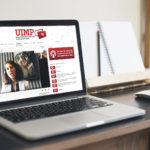"The value of physical space at the workplace has been redefined"
The world of work and professional environments are in the midst of a full blown transformation process, especially in the wake of the COVID-19 lockdown. According to Ophelie Richard, BBVA global head of Talent Acquisition, "the value of assigning workstations to specific individuals based on their hierarchy within the organization has been completely redefined." And this, in her opinion, "opens up great opportunities, from hiring employees regardless of their geographic location to workstation virtualization.”

Ophelie Richard was one of the guest speakers that participated in 'The financial system in the COVID-19 crisis: Challenges and Compromises’, a seminar organized by Spain's Association of Economic Journalists (APIE). Building on her experience as BBVA Talent and Culture area, Ophelie Richard discussed some of the challenges that the Spanish lender addresses when defining its recruitment policies in an environment marked by the pandemic, and the role of human resources amid the paradigm shift that remote work models are driving.
In the case of BBVA, Richard explained that the bank has been test-driving a number of hybrid work models since July, which combine the best of face-to-face work and the lessons learned from remote work.
The global head of Talent Acquisition at BBVA considers that "the pace of change will be dictated by the evolution of society and how individuals perceive their relationship with their jobs and their employers and, therefore, the nature of and how we value our jobs.” In her opinion, and "the great drivers of change will be demographic, climatic and, as we have learned first-hand, those linked to public health."
"Over the past 20 years, my generation has been a privileged witness to the wave of technological progress, innovation and, therefore, disruption that has rippled across all spheres of life," she explained. In the case of BBVA, she focused on the "online learning culture", which has turned employees into "the protagonists of their professional careers, development and ongoing training paths".
“We have gone from a model where employees moved or undertook different courses in compliance with the organization’s guidelines, to a new approach that offers them the resources and tools they need to design their own professional career path and customize their training,” explained Richard.

For BBVA’s Global Head of Talent Acquisition, "the goal is to broaden the horizon of everyone at BBVA to ensure their vision is not limited to the area they work for — or to what the bank may offer them at a specific point in time —, affording them more leeway to pursue their personal interests.”
This is why the bank has developed a model based on open platforms that allows everyone to explore their professional growth and development opportunities. “We have defined training itineraries in a number of disciplines, including data science, design, cybersecurity, programming and sustainability,” said Richard, who noted the success achieved by the model, especially at a time when remote work has become prevalent. “During the first 48 days of lockdown, traffic to the training portal increased by 96%, with more than two million logins and 1,200,000 hours of online training,” she detailed.

Candidates with new interests
Job search patterns and candidates' preferences when choosing where to work have also shifted significantly in this period. “Today, prospective hires take into account everything, from the employer’s reputation, social impact or diversity policies, to the training paths it offers to employees, the expert gurus that can be appointed to mentor them and the technologies used at the workplace,” she stated. “This is why companies need to adapt to this new reality and provide candidates with increasingly clear information that addresses their demands.”
“The way in which job openings are written can limit applicant diversity, which is why we must use inclusive — i.e, not exclusive — language in our job offers. Inclusive language is pivotal to attracting the diverse pool of talent that we are looking for,” she said, after explaining the process that led the bank to re-think the way it writes its job postings.
As for diversity, Richard noted the need to fine-tune candidate questionnaires to eliminate unconscious biases that may exist in traditional hiring processes: At BBVA we drew up a handbook entitled 'Normalization of differences' to raise awareness about key LGTBIQ+ diversity topics among our workforce. The handbook includes a checklist to avoid heteronormativity biases when interacting with people.
A new profile of recruitment professionals
In the light of this new reality, it is essential for the role of recruitment professionals to evolve. “In a short time we have gone from managing reactive processes (with candidates applying to job openings), to proactive processes where recruiters must actively identify valuable candidates while ensuring they offer them a good experience,” she commented.
Companies, through their recruitment teams and talent acquisition strategy, need to upgrade their strategies to approach potential candidates, and roll out alternative recruitment processes (such as 'hackathons’ and 'datathons'). One year ago we started including these types of challenges in our selection processes, to recruit future BBVA data scientists within the framework our 'Young Data Professionals' program through different 'datathons.
“To meet strategic objectives or address the most complex problems, organizations need to build new skillsets. “Increasingly, we’re looking for hybrid profiles that combine different areas of expertise,” concluded Richard.